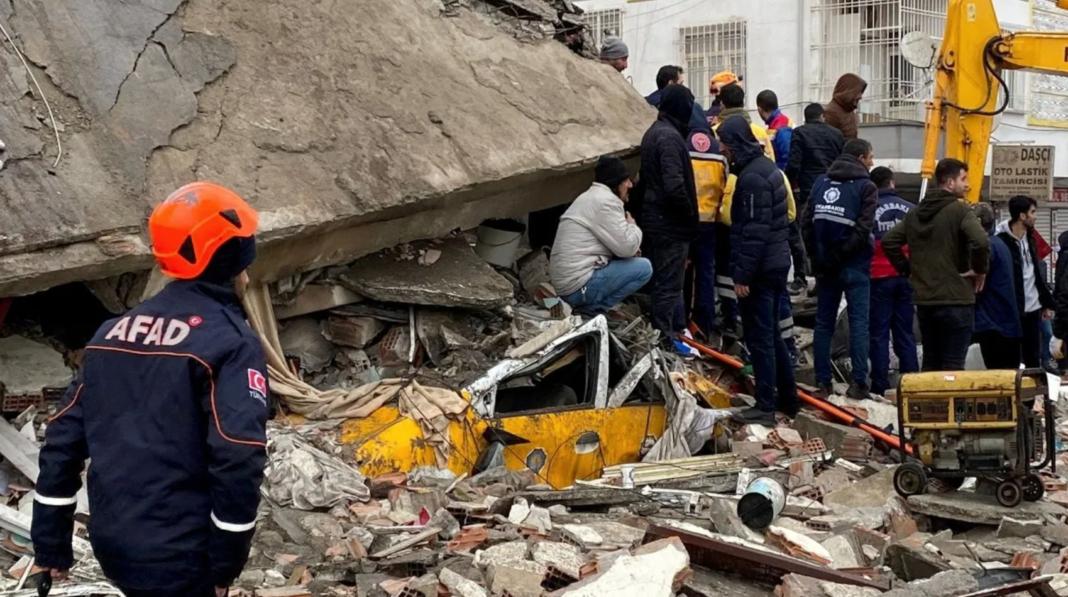David L. Phillips’s analysis in National Interest on February 22, 2023.
Turkey will require billions of dollars in foreign aid to clear debris and rebuild from the recent earthquake. Though more than 40,000 victims need a generous helping hand, assistance should be monitored to make sure funds are spent as intended. Channeling assistance through international NGOs would enhance the integrity of foreign aid. Donors must make sure their largess is not stolen by the incompetent, callous, and corrupt government of President Recep Tayyip Erdogan.
Despite that stringent construction standards were adopted after the last earthquake in 1999, Erdogan established sweeping exceptions out of fear that these standards would discourage construction and limit the country’s economic development. According to Turkish agencies, a plethora of contractors with ties to the government received amnesty. The flattened landscape in Antakya, the earthquake’s epicenter, is the consequence of Erdogan’s ill-advised amnesty policy. Corrupt business practices are widespread in Turkey. Erdogan’s government awarded government-funded infrastructure projects to cronies who cut corners on safety and environmental standards, which contributed to the high death toll in Antakya. Though the government collected large sums through an earthquake tax designed to build stronger buildings, the money was pocketed by corrupt officials. It is common practice in Turkey for businesses to pay bribes to the government in exchange for lucrative contracts.
Turkey is currently investigating about 400 contractors and has arrested 120. This roundup is a thinly-disguised effort to deflect blame by scapegoating construction companies. The investigation focuses on “small fish” instead of large construction companies with ties to the government. One of the worst offenders, for example, is Cengiz Holdings, a large construction company run by a Turkish oligarch and close friend of Erdogan. Cengiz Holdings received $42.1 billion in government contracts since Erdogan’s Justice and Development Party (AKP) came to power in 2002. It also contributed $160 million to the AKP.
The disastrous consequences of the Antakya earthquake were compounded by the government’s lack of preparedness. Rescue workers were slow to reach the scene. When they arrived, they lacked suitable equipment to identify and extract victims. Though Antakya is located in a known earthquake zone, the government failed to preposition tents, blankets, food, and water. The Turkish government has also been playing politics with earthquake relief. Soon after the disaster, countries rushed to send rescue teams. However, only “friendly” governments were allowed to assist. Cyprus offered rescue teams to Antakya, but the government refused its offer. Antakya is in Hatay province, home to many refugees from Syria and a large Kurdish population. Syrians and Kurds were bumped to the end of the queue when it came to emergency assistance. The government is loath to assist so-called oppositionists allegedly sympathetic to the Kurdistan Workers Party (PKK) against whom Turkey has waged a counterinsurgency campaign since the 1990s, which resulted in at least 40,000 deaths. The PKK announced a unilateral ceasefire within hours of the first tremor. It was not the first time the PKK laid down its arms in service of social harmony.
Erdogan boasts about Turkey’s strong state. It may be adept at waging war, but sorely lacks the capacity to address a civil emergency. Noble Turks in Turkish civil society immediately mobilized and donated supplies to the victims. Medical personnel flocked to Antakya, setting up clinics to assist earthquake victims. Though there was little coordination with the authorities, that did not dissuade their efforts. I’m in touch with doctors from a hospital in Ankara who went to Antakya to help. Their team of twelve people found a chaotic relief effort with the government all but absent.
Erdogan himself visited the earthquake zone as anger spiked over the government’s inadequate performance. He was accompanied by a gaggle of press to report on his visit. The extensive media presence made his drop-by look like a publicity stunt, rather than a sincere effort to comfort the victims. The optics of his visit compounded the government’s credibility problem. Erdogan was attired in a luxurious cashmere coat that cost thousands of dollars. The image of an elegant Erdogan surrounded by scantily clad victims backfired. He came off as uncaring, more concerned with public relations than the suffering of victims.
The earthquake compounded a widespread perception that Erdogan has broken faith with the Turkish people. The AKP has held a stranglehold on power for more than two decades. During this time, Erdogan consolidated power by establishing an executive presidency, expanding tyrannical rule, and abusing human rights with impunity. Earthquake victims are discovering they have something in common with victims of Erdogan’s human rights abuses. Turks turned a blind eye to the country’s eroding human rights situation in exchange for prosperity. Now Erdogan’s house of cards has been shaken by the Antakya earthquake. Turkey’s economy and currency have collapsed. Its reputation as a strong state is eroded. AKP officials have floated a proposal to delay national elections scheduled for May 2023. They worry—rightfully so—that Turkish voters will punish the AKP at the ballot box. The time of reckoning for Erdogan is drawing near.
David L. Phillips is Director of the Program on Peacebuilding and Human Rights at Columbia University. He served as a Senior Adviser and Foreign Affairs Expert at the State Department during the Clinton, Bush, and Obama administrations.
David L. Phillips’s analysis in National Interest on February 22, 2023.

